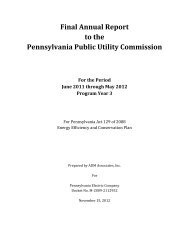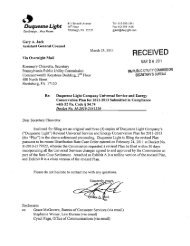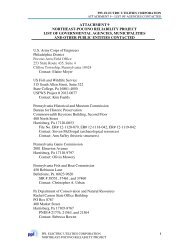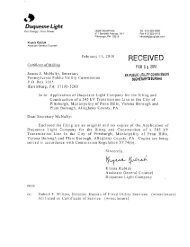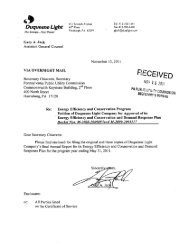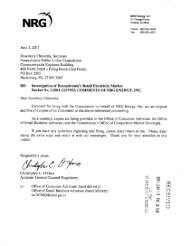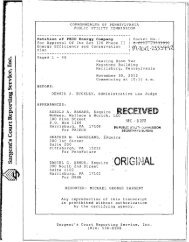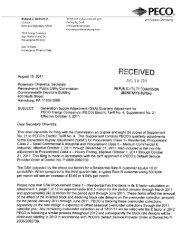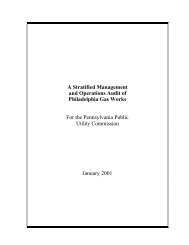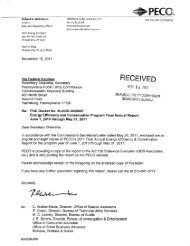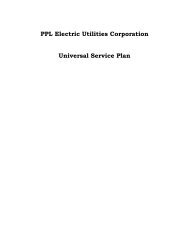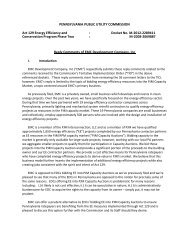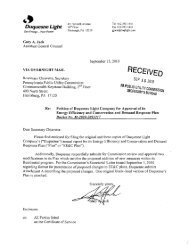Reliability Report -- 1999 - Pennsylvania Public Utility Commission
Reliability Report -- 1999 - Pennsylvania Public Utility Commission
Reliability Report -- 1999 - Pennsylvania Public Utility Commission
You also want an ePaper? Increase the reach of your titles
YUMPU automatically turns print PDFs into web optimized ePapers that Google loves.
<strong>Utility</strong>-Specific Performance Data<br />
The reliability performance data provided herein for each of the indices represent, for the most part,<br />
rolling 12-month averages. Benchmarks are based on the averages of index values computed for the<br />
12-month periods ending December 1994 through December 1998. Some benchmarks have been<br />
adjusted in subsequent proceedings. The 12-month standard is 120 percent of the benchmark for large<br />
EDCs and 135 percent for small EDCs. The three-year standard is 110 percent of the benchmark for all<br />
EDCs.<br />
The <strong>Commission</strong> compares reliability indices on a quarterly basis, using data obtained for the preceding<br />
12 months. This periodic assessment determines the current status of electric service reliability on an<br />
ongoing basis and is instrumental in identifying negative trends. The three-year average performance is<br />
measured at the end of each calendar year, using the average of the past three end-year indices, as<br />
indicated in Appendix A.<br />
Citizens’ Electric Company<br />
Citizens’ has a relatively small operating area with an electric system consisting of one distribution<br />
substation and nine distribution feeder lines.<br />
In 2010, Citizens’ experienced a total of 1,262 customer interruptions, with a total duration of 124,028<br />
minutes, excluding major events, which was 21.3 percent higher than that which was reported last year.<br />
The calculation of the 2010 reliability indices excludes outage data relating to two major events, which<br />
were approved by the <strong>Commission</strong>. 24<br />
• March 6, 2010 – A squirrel contact caused a single substation circuit to lock out; 1,111<br />
customers were affected (16.3 percent).<br />
• July 9-10, 2010 – A suspension insulator failed during a heavy rain; 1,056 customers were<br />
affected (15.5 percent).<br />
Citizens’ CAIDI increased from 75 minutes in 2009 to 98 minutes in 2010, which was a 30.7 percent<br />
increase in CAIDI minutes but still 6.7 percent better than the benchmark of 105 minutes. Citizens’<br />
quarterly CAIDI has been below the benchmark since 2004, except for the last quarter of 2005. The<br />
CAIDI three-year average was 36 minutes or 31.3 percent below the standard of 115 minutes. For the<br />
12-month average ending March 31, 2011, CAIDI was 77 minutes, or 26.7 percent below the<br />
benchmark. SAIDI dropped from 15 to 11 minutes. Figure 3 depicts the trend in the duration of<br />
customer interruptions for the Citizens’ system from March 2004 through March 2011, compared to the<br />
established benchmark and standard for CAIDI.<br />
Citizens’ SAIFI decreased from 0.20 in 2009 to 0.19 in 2010, which was a 4.5 percent improvement in<br />
outage frequency and 5.0 percent better than the benchmark of 0.20. Except for the years 2003 and<br />
2004, SAIFI has been better than the standard of 0.27 since 2000 and below the benchmark for seven<br />
years. The SAIFI three-year average was 1.5 percent below the standard of 0.22. For the 12-month<br />
average ending March 31, 2011, SAIFI was 0.14, or 30.0 percent below the benchmark. Figure 4<br />
depicts the trend in the frequency of service interruptions for the Citizens’ system from March 2004<br />
through March 2011, compared to the established benchmark and standards for SAIFI.<br />
24 Docket Nos. M-2010-2170867; M-2010-2187965.<br />
10<br />
<strong>Pennsylvania</strong> <strong>Public</strong> <strong>Utility</strong> <strong>Commission</strong>




